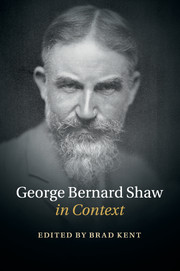Book contents
- Frontmatter
- Dedication
- Contents
- List of illustrations
- Notes on contributors
- Preface
- Acknowledgements
- A Chronology of Shaw's Works
- List of abbreviations
- PART I PEOPLE AND PLACES
- PART II THEATRE
- 7 The Abbey Theatre
- 8 Actors and actresses
- 9 The Court Theatre
- 10 Fabian drama
- 11 Farcical comedy
- 12 History plays
- 13 Melodrama
- 14 The New Drama
- PART III WRITING AND THE ARTS
- PART IV POLITICS
- PART V CULTURE AND SOCIETY
- PART VI RECEPTION AND AFTERLIFE
- Further reading
- Index
- References
9 - The Court Theatre
from PART II - THEATRE
Published online by Cambridge University Press: 05 October 2015
- Frontmatter
- Dedication
- Contents
- List of illustrations
- Notes on contributors
- Preface
- Acknowledgements
- A Chronology of Shaw's Works
- List of abbreviations
- PART I PEOPLE AND PLACES
- PART II THEATRE
- 7 The Abbey Theatre
- 8 Actors and actresses
- 9 The Court Theatre
- 10 Fabian drama
- 11 Farcical comedy
- 12 History plays
- 13 Melodrama
- 14 The New Drama
- PART III WRITING AND THE ARTS
- PART IV POLITICS
- PART V CULTURE AND SOCIETY
- PART VI RECEPTION AND AFTERLIFE
- Further reading
- Index
- References
Summary
On 7 July 1907 a dinner was held at the Criterion restaurant in London to celebrate three successful seasons of avant-garde repertory at the Court Theatre under the artistic direction of Harley Granville Barker and the financial management of J. E. Vedrenne. In his speech, Barker praised Shaw as ‘an inspiration’, first among the theatre's authors, adding that ‘I might call him the goose that has laid the golden eggs, if I could not find another more suitable metaphor by thinking of him as our Ugly Duckling’. Shaw's drama had indeed been the foundation stone of the Court's repertoire: 701 of the 988 performances staged over the three years it ran, from 1904 to 1907, were of Shaw's plays, including 149 performances of You Never Can Tell, 121 of John Bull's Other Island, and 176 of Man and Superman. His plays crucially enabled the seasons to run at a small profit, a position that Shaw happily accepted, writing to Eleanor Robson in August 1905 of the theatre's financial position that ‘nothing they have done has paid except my plays. By the help of my plays & the guarantee they carry they are able to give matinées of good plays which give the theatre its standing as the artistic and intellectual London theatre; but these matinées barely pay expenses at best; and without my support the enterprise must collapse’ (CL II: 550). As Barker declared with justified pride, the Court seasons also saw Shaw's emergence as ‘the Swan of Adelphi Terrace’, a popular and admired playwright whose plays were finally recognised as even more effective and entertaining on stage than they were in print.
The Court's repertory of new plays and translations by British and European playwrights was the brainchild of Barker, and the realisation of ideas he had first developed in a letter to theatre critic William Archer in 1903. Private theatre societies, such as J. T. Grein's Independent Theatre, Archer's New Century Theatre, and, above all, the Stage Society, had done crucial work in staging plays not attempted by West End managers, including radical works that had been refused a public performance licence, of which they offered matinée performances to private subscription audiences.
- Type
- Chapter
- Information
- George Bernard Shaw in Context , pp. 68 - 75Publisher: Cambridge University PressPrint publication year: 2015



